For teens competing in Tokyo, balancing high school life and training an everyday routine
Bryce Wettstein isn’t quite sure what’s real or fake anymore.
The 17-year-old skateboarder is computing things differently these days. Her airy voice might make people who hear her speak think her head’s in the clouds, but it certainly isn’t. Wettstein regularly contemplates things like neuroscience and quantum physics.
It’s part of the reason she takes a pause before going to bed each night.
“Because suddenly, when I'm about to dream, I'm like, ‘Am I even dreaming?’” Wettstein said. “I feel like I was already in a dream.”
Wettstein is one of several Team USA members competing in the Tokyo Olympics before they’re old enough to book their own hotel room or register to vote. She’ll return to San Dieguito Academy in Encinitas, California, in the fall for her senior year of high school.
NEVER MISS A MEDAL: Sign up for our Olympic newsletter now
TEXT WITH US AT TOKYO OLYMPICS: Subscribe to texts, where we’ll be your official guide to the Games
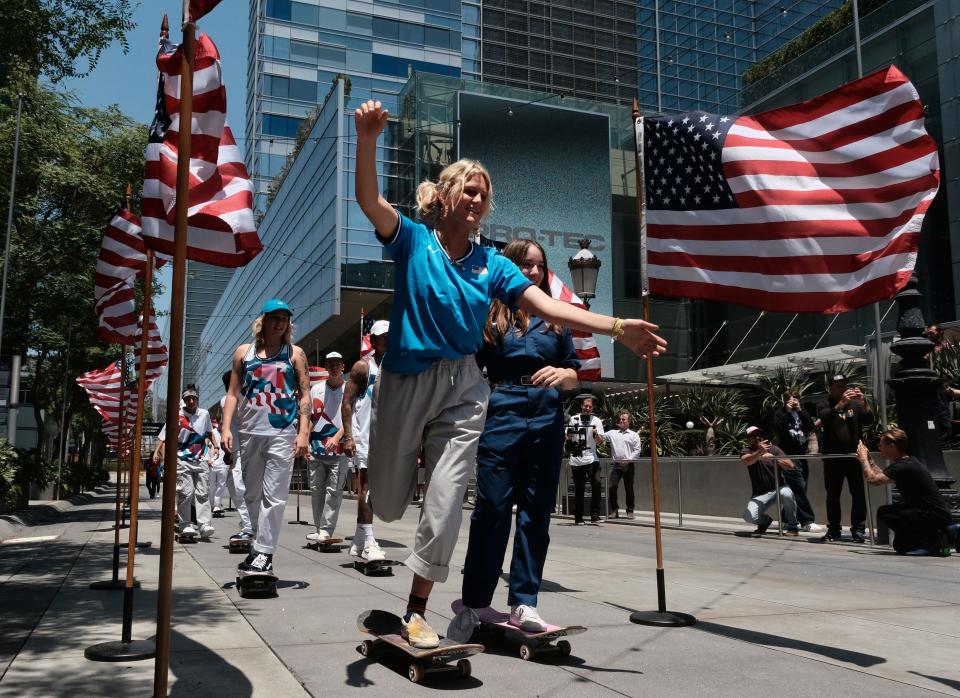
The task nine American high schoolers have achieved already just by qualifying for the Games is a life-defining one. Even before Lydia Jacoby, 17, won gold in the women's 100-meter breaststroke, her friends and family in Seward, Alaska, were already celebrating her accomplishment.
“She has made this little Alaskan town burst with pride,” Albert Plan, athletic director at Seward High School, wrote in an email to USA TODAY Sports on July 8.
High schoolers competing at the Olympics isn’t uncommon, and other countries are sending competitors even younger than the U.S. In newly-added Olympic sports such as skateboarding and climbing, the demographic of athletes is younger and spans a wider age range. The U.S. skateboarding team’s average age is 19 with the oldest member turning 35 this year. USA climbing’s average team member age is 22.
“At the moment on the international [climbing] stage you're seeing kids, especially girls, even as young as 15 have success internationally, but then there's also climbers that are well into their late 20s and 30s,” Colin Duffy, the youngest member of USA Climbing headed to the Games, said. “I think in Tokyo the oldest guy is 35 and has kids, and then there's me at 17.”
A year off
For Claire Curzan, the extra year provided to her when the Tokyo Games were delayed from 2020 to 2021 because of the pandemic might have been the difference between not making and making the U.S. Olympic swimming team.
Curzan was 16 when she finished second in the 100 meter butterfly on June 15 at the U.S. Olympic Swimming Trials and qualified for the Games. She turned 17 later that month, and said she thinks the postponement “was kind of the reason why [she] qualified this year.” At 15, Curzan said her body would have been less developed than others in her event, the oldest of whom was born 10 years before her.
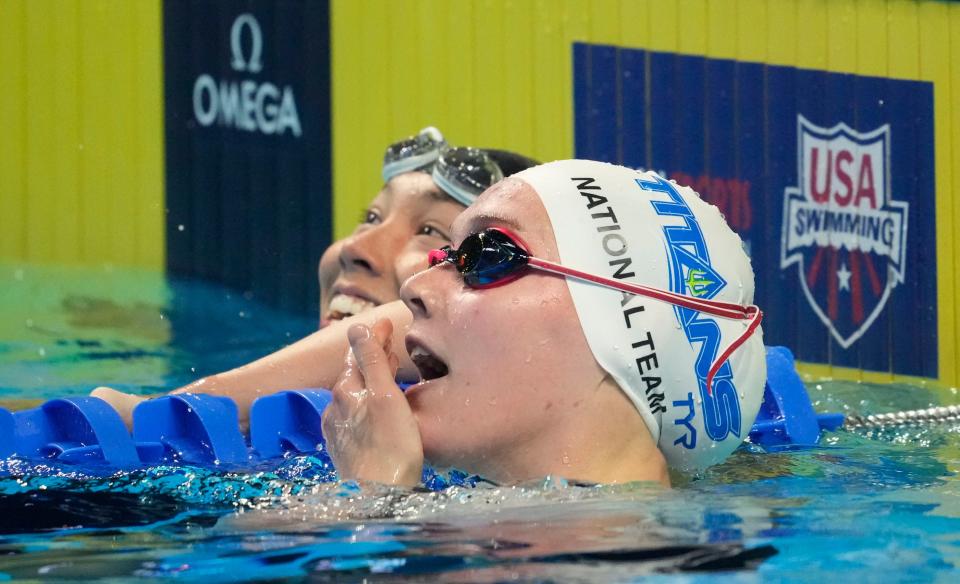
But while the extra year gave Curzan more time to work on her strength and fitness – she increased her dry-land workouts and running – moving the biggest competition of the year and not being able to hop in a pool whenever she wanted took a mental toll.
“You kind of have a date set in your mind and once that gets altered, you have to reset the clock,” Curzan said. “They shut down all the pools and you're kind of sad, sitting there like, ‘Well, the longest break I've taken in all my life from swimming is like a week or two.’ And here we are out of the water for months.”
Brighton Zeuner, a 16-year-old member of the U.S. Olympic Skateboarding team, felt similarly. Zeuner has been skateboarding for over 10 years and competing for eight. She became the youngest X Games park champion in 2017 when she was 13 years old.
“During COVID time, I definitely had really bad anxiety about getting back into contest skating because there was a year and a half that just there's no contest or skating really,” Zeuner said. “I was so used to traveling, being active, staying out, being in the sun and I just totally was just in my room a lot just having terrible anxiety about competing. For a while, I was like ‘Oh my god, I don't think I can do this,’ because I just lost myself so much.”
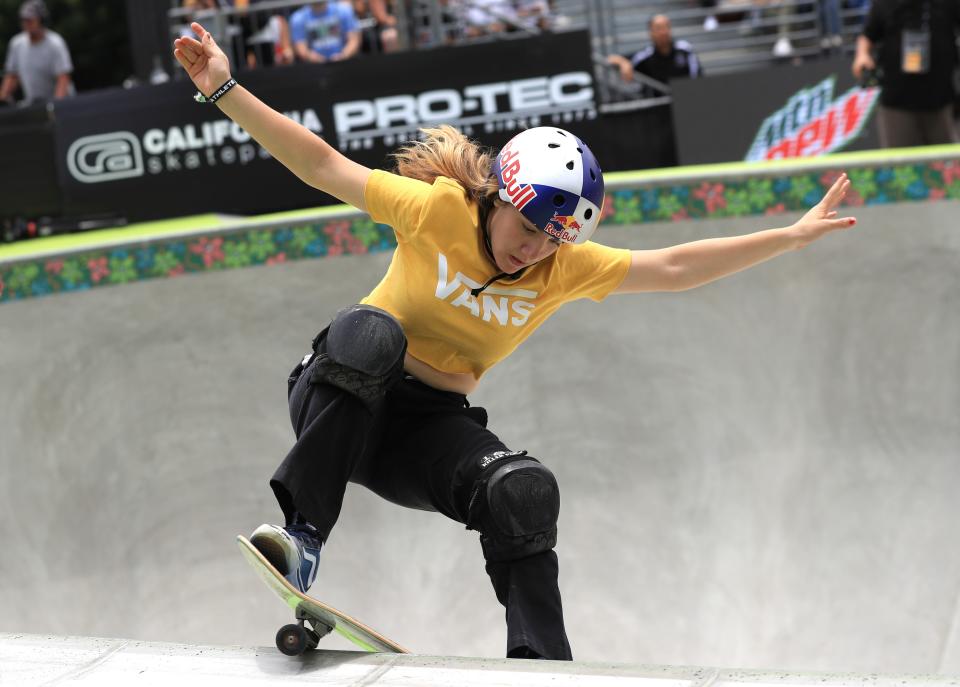
Multiple studies have shown that the pandemic negatively affected the mental health of teenagers and young adults. Since the beginning of the pandemic in March 2020, 46% of parents said their adolescents had shown signs of new or worsening mental health conditions, according to a study conducted by the University of Michigan. Three in four parents also reported the pandemic had a negative impact on their teen’s interactions with friends.
Curzan said she swam six days a week prior to the pandemic, sometimes doing two to three workouts in a single day on top of school. Zeuner regularly spends days and nights working out in San Diego, away from friends in Orange County. Duffy’s team practices from 6-9 p.m. at night, at a gym 40 minutes away from his Denver home.
While the benefits reaped from sacrificing parts of their teenage experience ultimately outweigh what they’re losing, it doesn’t make it less difficult.
“I'd say I definitely do miss out on a lot of socializing parts of being a high schooler, which definitely having to make those sacrifices is worth it. But there's definitely times that I find myself wishing things were a little bit more normal,” Duffy said.
That’s not to say these teens don’t try to achieve a work-school-life balance. Zeuner had just spent a day at the beach with a friend when she spoke with USA TODAY Sports. She enjoys the teenage mall-hangout, going out for food and other “regular kids stuff.”
There are some hopes that the Olympics themselves will provide some free time and a chance to make new friends.
“I think I'm just excited for everyone because I think it's so fun how all of us younger kids get to do it the first time together,” Curzan said. “I think there's a lot of newbies, so we kind of get to go through this great experience together.”
On the ground in Tokyo
The excitement for Tokyo is palpable, and an added year of waiting only heightened expectations. There’s still some uncertainty surrounding the event, even for the athletes, but Wettstein said she gets goosebumps even thinking about being in the host city.
“You talk about something for so long that when you're there, it's going to take you a while to even notice that you're standing on the ground and in Tokyo because you're always just thinking of it,” she said. “It's never really going to register that you're in the place that you've been envisioning for over two and a half years.”
Due to COVID-19 restrictions, it’s likely that Olympians will get to spend little, if any time, outside the Olympic Village or even mingling with athletes outside of their own team. There are a plethora of protocols in place for athletes while in Tokyo – from mandatory masking to not being allowed to use public transit .
Curzan said some of the older members of the swim team gave recommendations on how and what to pack for the over two-week-long trip to keep busy in between practices and races. She and Jacoby, who Curzan said she’d probably never have met if not for the Games, are roommates.
Zeuner and Wettstein will also be staying together in their own corner of the village. The two have known each other since they were 9 years old – Wettstein recalls them playing Polly Pockets – and have competed against and alongside each other ever since. Surprisingly, the pair isn’t the youngest in the skateboarding competition, as Great Britain’s Sky Brown, 12, will also tackle the park course. They are, however, the youngest competitors for Team USA in the sport.
“We might have envisioned friendship, but when friendship is alongside something that's also a platform for a whole world, it's something that finally completes your revolution and it's a revelation really to have somebody that you love so much,” Wettstein said.
Zeuner said, “I see her in my life until I'm an old lady, so it's really gonna be cool being able to talk about this for a while and we're both looking forward to it. We're like, nervous, excited.”
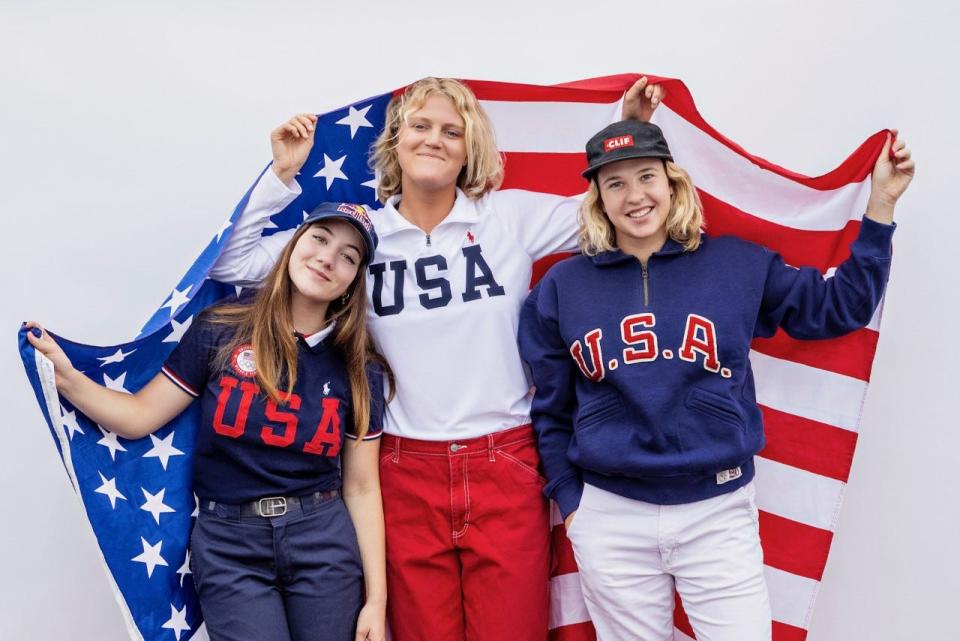
The nerves heading into the Olympics come from a variety of topics for the young Olympians. Curzan, for example, who has a number of food allergies and eats an Oikos yogurt before every practice and meet, was curious what meals would be served in the village. An overarching concern for these teens, though, is the fact that their parents won’t be in Tokyo alongside them.
Duffy has competed in a number of international events in 2021 that his parents couldn’t travel with him for, but Zeuner and Wettstein are used to having their parents by their side at competition. The International Olympic Committee announced in March that no international fans would be allowed to attend the Games. On July 8 that ban extended to all fans, even Tokyo residents, as the city re-entered a state of emergency due to a rise in COVID-19 cases.
“I think the only part that's really frustrating and hard is that I might not be able to bring my dad because of just restrictions,” Zeuner said. “Bryce and I are kind of scared about not having our parents because I've always had my family there with me. My dad has definitely been a big part of how I perform.”
Curzan and her family have been keeping in touch via FaceTime and phone calls since she left her home in North Carolina in June to travel to Hawaii and then Tokyo with Team USA. Mark Curzan has always traveled to meets with his daughter, but recognizes how important it is for her to be at the Games, even without him.
"The fact is your first time could be the only time," Mark Curzan said. "You can't count your chickens. Yeah, she's on the younger side, so she could have more opportunities, but the fact that it's not an annual event, but every three or four or five year event, I think it'd be so fun to experience a different culture, different world, different country."
'It's a really cool box to check'
The goals Curzan, Zeuner, Wettstein and Duffy have set for themselves at the Olympics are perfect reminders of something that could go forgotten if they perform well in Tokyo: they’re just kids.
“I really just want to hopefully climb to the best of my ability and just enjoy every moment of it,” Duffy said. “If I feel like I gave everything I could then I'll be satisfied with whatever the result is.”
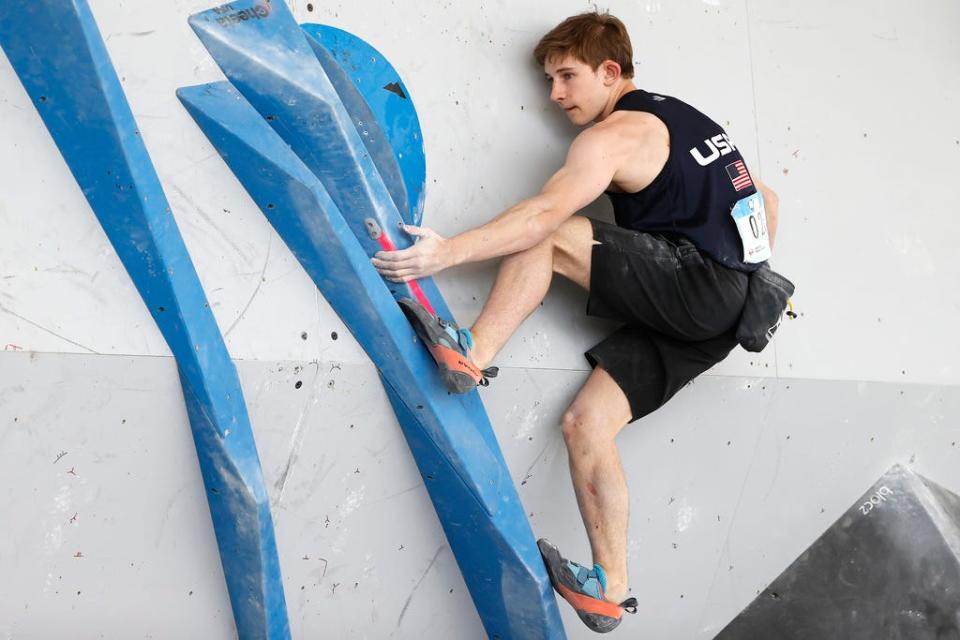
For Duffy, climbing at the Olympics hadn’t even formed as a dream when the sport was announced as an addition in 2016, and still didn’t seem like a plausible one until early 2020. He’ll have time to medal in the future; 2021 is about focusing on the experience.
This year’s group of teens hope to follow in the footsteps of decorated Olympians who started their careers while still in high school. Swimmers Katie Ledecky and Michael Phelps were both 15 at their first Olympics. The Fierce Five U.S. women’s gymnastics team in 2012 were all 18-years-old or younger when they won gold.
“I'm probably just gonna be happy that like it's a really cool box to check in your life and it's just gonna be crazy,” Zeuner said. “We've all been waiting for this to happen for a while now and it finally, finally is.”
When these high schoolers arrive back home from Tokyo and reunite with their parents, their focus will shift back from training and competition to the upcoming school year. Tokyo will no longer be a dream, or even a reality. Instead, it will be a memory.
Contact Emily Leiker at eleiker@usatoday.com or on Twitter @emleiker
This article originally appeared on USA TODAY: 2021 Olympics: High schoolers balance school, training to compete

